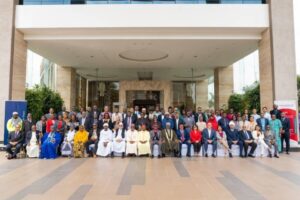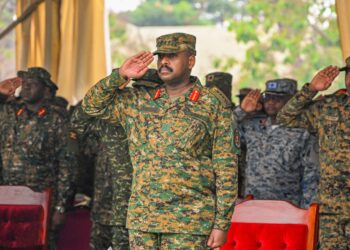
The Mufti of Uganda, Sheikh Shaban Ramadhan Mubajje, has been reappointed as Co-Chair of the African Council of Religious Leaders – Religions for Peace (ACRL-RfP) for another five-year term.
The announcement was made on Wednesday, August 20, 2025, at the Uganda Muslim Supreme Council (UMSC) headquarters in Old Kampala, where the Mufti was chairing a National Management Committee meeting with departmental heads.
His reappointment was confirmed during the Council’s 5th General Assembly held recently in Nairobi, Kenya. The high-level gathering, held every five years, brings together faith leaders from across Africa to renew leadership and set priorities for peace and development.
Although Mufti Mubajje had asked to retire after 25 years of service, the Assembly unanimously turned down his request.
“I humbly asked to retire, but the Assembly insisted that I continue. They said my experience and leadership were still needed, especially now when the Council is going through a leadership transition,” he explained.
Joining him in leadership is The Most Reverend Albert Chama, the Anglican Archbishop of Zambia, who was appointed as Co-Chair.
The move comes at a critical time, as the Council’s Secretary General is set to take up a new role as head of the World Council of Religions for Peace International in New York starting January 2026. Leaders feared that losing too many senior figures at once could destabilize the Council.
During the UMSC meeting, Mufti Mubajje unveiled two key outcomes from the Nairobi Assembly:
-
The Nairobi Declaration on Shared Sacred Flourishing for Peace and Justice in Africa – a three-page call for bold action to end wars, protect human dignity, and intervene in conflict zones such as Sudan and the Democratic Republic of Congo.
“Peace and justice are sacred duties, not political luxuries. We must move beyond words to real action,” the Mufti stressed.
-
A Transformational Vision for Development and Peace Strategic Plan (2025–2030) – a roadmap outlining the Council’s priorities over the next five years, including peacebuilding, democracy, environmental protection, and social justice.
Deputy Mufti Sheikh Muhammad Ali Wasswa and UMSC Secretary General Haji Abbas Muluubya Ssekyanzi were among those who praised the Mufti for his steadfast leadership and for keeping Uganda at the center of continental religious affairs.
Mufti Mubajje’s reappointment highlights the growing importance of faith leaders in tackling Africa’s toughest challenges – from violent conflict and extremism to climate change and economic hardship.
“Religious leaders must become the bridge between suffering and hope. We are not just called to pray for peace – we are called to build it,” he concluded


















